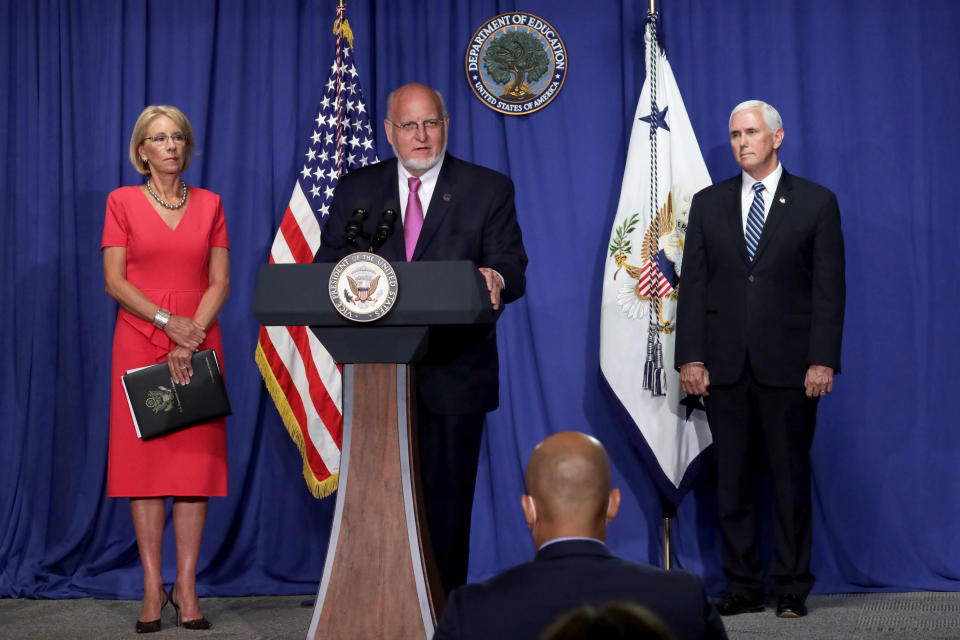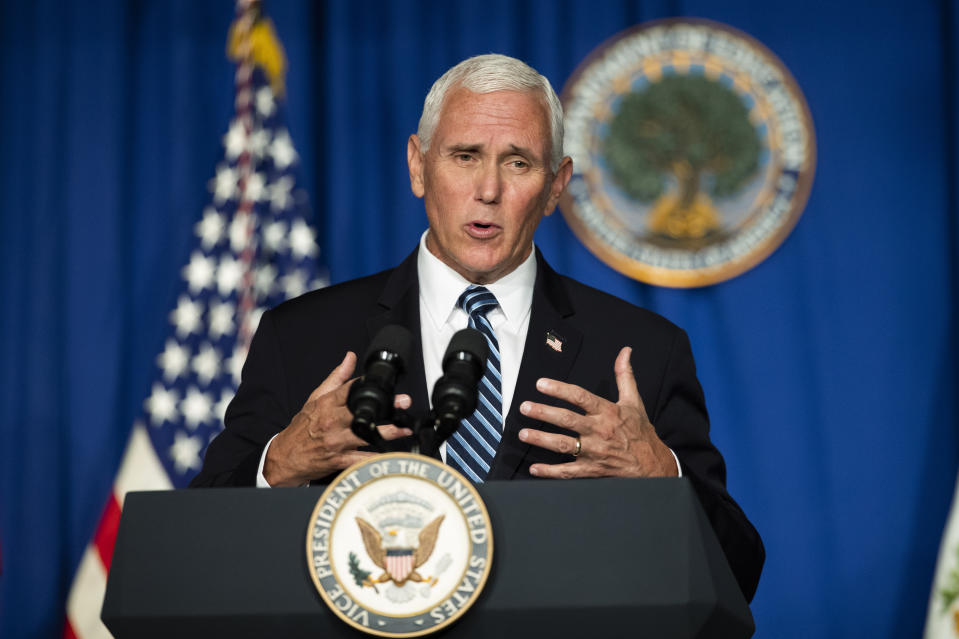CDC says guidelines for reopening schools are 'not requirements' after Trump calls them 'impractical'
After President Trump on Tuesday lashed out at what he called “impractical” and “expensive” guidelines for reopening schools published by the Centers for Disease Control and Prevention, the agency’s director emphasized that they were meant as recommendations, not mandatory standards, and “should not be used as a rationale to keep schools closed.”
“Remember it’s guidance, it’s not requirements,” CDC Director Robert Redfield said during a briefing by the White House coronavirus task force. “And its purpose is to facilitate the reopening and keeping open the schools in this country.”
His comments came hours after Trump criticized the CDC’s guidelines and threatened to withhold federal funds from school districts that don’t reopen fully and on schedule for in-person classes, and a day after a White House conference on school reopenings at which first lady Melania Trump made a rare public statement.
“I disagree with @CDCgov on their very tough & expensive guidelines for opening schools,” the president tweeted early Wednesday. “While they want them open, they are asking schools to do very impractical things. I will be meeting with them!!!”
In an interview with Good Morning America Thursday, Redfield said the guidelines would not be revised, but his agency would provide “additional reference documents to aid basically communities that are trying to open K-through-12s.”
Trump pointed to European countries as models for reopening and reiterated his claim that Democrats want schools to remain closed for political reasons.

“In Germany, Denmark, Norway, Sweden and many other countries, SCHOOLS ARE OPEN WITH NO PROBLEMS,” he wrote. “The Dems think it would be bad for them politically if U.S. schools open before the November Election, but is important for the children & families. May cut off funding if not open!”
According to the guidelines published on the CDC’s website, students and teachers engaging in virtual-only classes and activities are considered at the lowest risk for contracting the coronavirus, while small, staggered in-person classes with students remaining at least 6 feet apart are listed under the label “More Risk.”
Also Tuesday, New York City Mayor Bill de Blasio said the nation’s largest school district would reopen this fall on a “hybrid” model, in which most students would be in classes for two or three days and receive online instruction for the remainder of the week. But New York Gov. Andrew Cuomo has insisted he will decide whether and how classes should resume in the state, so the final plan remains in limbo.
Asked about Trump’s threat to withhold federal funding for schools, Vice President Mike Pence, the head of the coronavirus task force, softened the administration’s tone, saying that in some places it may not be feasible to resume in-classroom learning.
“While we hope every school is able to open this fall, there may be some states and local communities that, given cases or positivity, that community may adjust to either a certain set of days or certain limitations,” Pence said. “And we’ll be very respectful of that.”

“What the president made clear, though, is that we think it’s absolutely imperative that every state and territory in the country take steps to get kids back in the classroom to the fullest extent possible,” he continued. “We really believe that every state has the ability to do that. But for those individual communities that may be seeing outbreaks, we will work with them to give them the guidance and support to implement the policies that they deem are most appropriate.”
“We just don’t want the guidance to be too tough,” Pence added, noting that the CDC would be issuing “a new set” of guidelines next week.
A reporter asked Pence why the CDC’s guidelines shouldn’t be tough, since they involve the health of the nation’s schoolchildren.
“Apart from having an underlying condition, children do not appear susceptible to having a serious illness from the coronavirus,” Pence said. “That’s been a blessing.”
But later at the same briefing, Dr. Deborah Birx, another member of the task force, admitted there isn’t enough data to draw definitive conclusions about coronavirus transmission among school-age kids, since very few are being tested for COVID-19.
“Our data is skewed to people with symptoms and then those over 18,” Birx said.
_____
Read more from Yahoo News:



